Ecommerce sales in America surpassed US $870 billion in 2021, showing a remarkable 50.5% increase from the 2019 figure. Also in the same year, 13.2% of all retail sales in the U.S. came from ecommerce alone.
Globally, ecommerce is following a similar trend of rapid growth. Worldwide retail ecommerce sales were estimated to be over US $4.9 trillion in 2021, however, it is expected that by 2025, they will have increased by 50% to reach around US $7.4 trillion.
Indeed, such phenomenal growth also means it’s likely that there will be fierce competition among online retailers, and that is why ecommerce marketing platforms and software are flourishing along with the astonishing expansion of the ecommerce industry.
With this in mind, read on for the essential ecommerce marketing tools that all ecommerce operators should be aware of!
Table of Contents
Overview of ecommerce marketing
Must-know ecommerce marketing tools
Take it to the next level
Overview of ecommerce marketing
Similar to the marketing mix for general business, there are a great deal of ecommerce marketing methods available out there. SEO (search engine optimization), email marketing, and social media marketing are among the cornerstones of ecommerce marketing strategies that notably set ecommerce marketing apart from other marketings.
Two other common ecommerce tools in online business marketing include content marketing tools for target content creation and research or analytic tools, which help to analyze the marketing method’s effectiveness for further improvements.
Fortunately, the majority of ecommerce solutions on the market offer either free versions or free plans, or at the very least, a brief free trial period to help companies, especially small businesses, to pick the right tools at the right time.
Must-know ecommerce marketing tools
SEO and content creation tools
We’ve all heard the saying that “content is king.” It originated 25 years ago, but is just as, if not more, relevant today. Indeed, whether it’s digital marketing or ecommerce marketing, most websites and online media today are still appreciated and frequented for their content. Bearing this in mind, ecommerce marketers should constantly deliver relevant and up-to-date content. Here are the best ecommerce marketing tools for SEO and content creation:
- Canva
Canva makes an ideal content creation and management tool for graphics-rich and design-oriented ecommerce stores or companies. It’s among the top free ecommerce marketing tools and is simple to use.
It can be utilized to create, design, or edit almost all types of graphic intensive content including common design files such as logos, brochures, banners, thumbnails, presentations, and social media posts as well as campaign-oriented files such as invitations, newsletters, and even ebooks!
Its multiple design templates include a free online video editor that allows instant edits on videos for different social media platforms according to chosen templates.
The great news is all these features are available for free and you may also invite other team members to participate in the project. The addition, the below-three-digit yearly fee can then grant you access to thousands of premium templates, millions of stock pictures, much bigger cloud storage space, as well as round-the-clock customer service.
Click here to find out if this online marketing tool for ecommerce suits your needs!
- Semrush
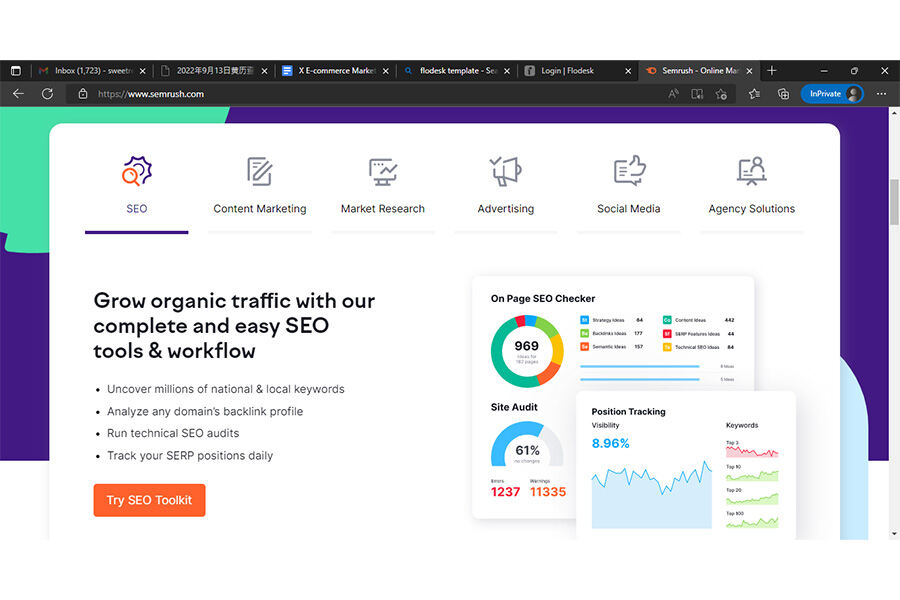
Content marketing is incomplete without powerful SEO tools to connect specific keywords with relevant content. Established in 2008, Semrush is one of the most highly recommended SEO keyword tools for general websites and is a fantastic ecommerce marketing tool to utilize.
As one of the veterans among the SEO providers, Semrush covers basically all types of essential SEO functions. A free account with Semrush allows users to conduct keyword research, competitor analysis, website audits, and more SEO features to improve their keyword usage.
On top of these standard SEO analytic and content optimization tools, it has evolved from SEO improvement for websites and blogs to social media content as well. Semrush free account users can also use it for competitors’ social media activity tracking, optimized posting schedules, and boosting Facebook posts.
Basically, from SEO keyword research and technical audits to a user-friendly interface and a variety of value-added features such as advertising, comprehensive competitor research, and social media toolkits, Semrush provides a set of efficient SEO tools that are easy to use.
The main differences between free and paid accounts lie in the number of projects (domains) that can be created in order to gain access to certain tools, the total number of results shown as well as the availability of certain features such as the Pay-Per-Click (PPC) keyword tool and access to historical data.
Similar to Canva which provides a free trial for access to all its Pro package features, full Semrush functions are available on a free 7-day trial. You can check out this link for a comparison between different packages of Semrush to determine your needs.
- Yoast
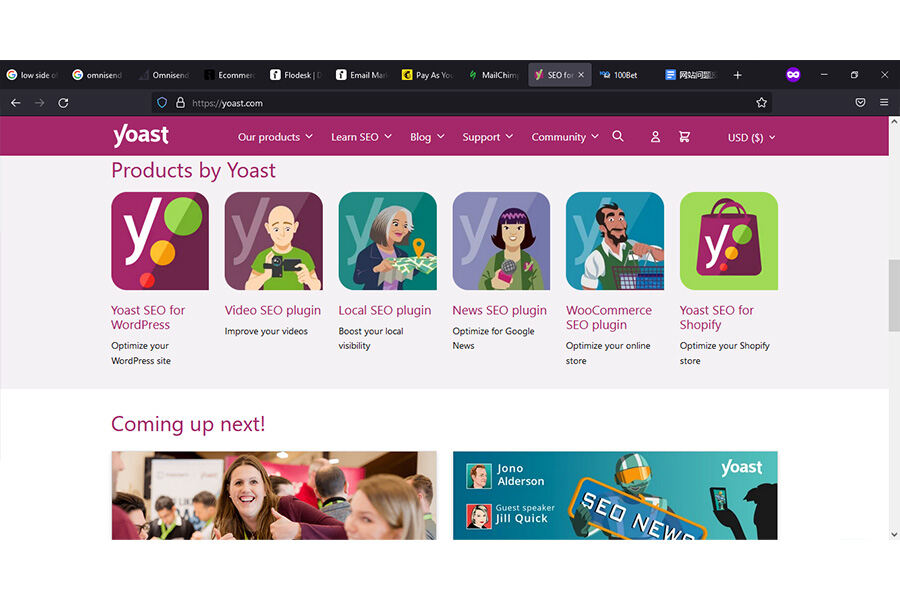
Meanwhile, for ecommerce websites or stores that are hosted on WordPress or Shopify, Yoast, known as the number one search engine optimization plugin on WordPress, could be one of the best marketing tools available today.
With almost 15 years of SEO expertise specialized in WordPress sites, Yoast has always provided an up-to-date and high quality SEO technical standard, multi-language analysis, and various optimizations.
Nevertheless, while its free version covers some basic SEO functionalities such as snippet preview, SEO content analyzer, and up to 8 social network optimizations, it allows only 1 keyword instead of multiple keywords. In order to use multiple keywords, the user must subscribe to a fixed annual fee package instead. Click here to find out the full details about what its paid package includes.
- Buzzsumo
Buzzsumo is a tool for flexible content marketing and research. It allows social media research such as Facebook analysis for content relevant to businesses. Basically, it serves to assist you in determining the most appropriate content to use for any given topic. It can be used to discover any trending topics and the headlines that are able to create the most talk for pretty much anything under the sun.
Meanwhile, Buzzsumo also helps to provide insights on key influencers in your sector and connect your business with them. This can be really helpful to anyone who is looking to promote brand recognition or assorted advertising efforts. Besides facilitating relevant influencer engagement, users may also find it useful for new content ideas, in-depth analysis, competitors’ research, and backlinks set-up.
The free plan of BuzzSumo enables limited search and features which are restricted to a single user only. Other standard paid plans enable up to 15 users. Its Enterprise plans, however, allow more users with customized requirements. All paid plans come with a respective free 30-day trial period for users to try out first. Find out more about it here.
- Marketing Hub
Finally, there is a range of marketing software out there that offer various scalable tools, including multiple free content marketing features, to boost your content.
Marketing Hub by Hubspot is a great example of such all-rounded marketing software. It is basically a marketing automation software that eases content creation with an all-encompassing WordPress plugin for marketing. It also comes with an effective form builder and chatbot / live chat functions. All these features help to optimize content for the appropriate target audience.
While Marketing Hub also provides a free plan, it comes with limited functions and without any email / in-app chat support as well as all the content strategy and multi-language content. Check here for more details.
Email marketing tools
The use of email was popularized back in 1981. More than 40 years have passed and email remains one of the most-used communication tools, be it for business or personal purposes. Here is a list of top email marketing tools to check out:
- Flodesk

With a plethora of easy-to-use and colorful design templates, Flodesk makes a fantastic email marketing solution for ecommerce sites that are design-focused or with plenty of graphics.
It also includes multiple visually centered features such as an Instagram feed and video embedding in its email template. Unlike most other email marketing tools which charge according to the number of subscribers, the fixed monthly blanket rate of Flodesk helps to provide peace of mind.
This allows marketers to focus specifically on email marketing, rather than the constantly-rising costs as the subscriber base grows. A lump sum annual fee payment can provide further savings of a 1-month fee, and anyone may sign up for a 30-day free trial to test out the features. Click here to find out more about it.
- Mailchimp
Having a convenient WordPress plugin, Mailchimp is one of the most widely-used email marketing tools for customized, personalized email automation. It comes with built-in templates for newsletters, email campaigns, and landing pages for quick editing and design.
Beginners who have below 500 contacts (this used to be up to 2000 contacts!) can enjoy its services for free but with very limited email template selection and without any customer support. More templates, custom branding, and customer support are available for paid packages starting from a low two-digit monthly fee. Alternatively, you may also contact them for a pay-as-you-go package, where you can simply purchase email credits depending on your requirement.
Find out more about Mailchimp here.
- Omnisend
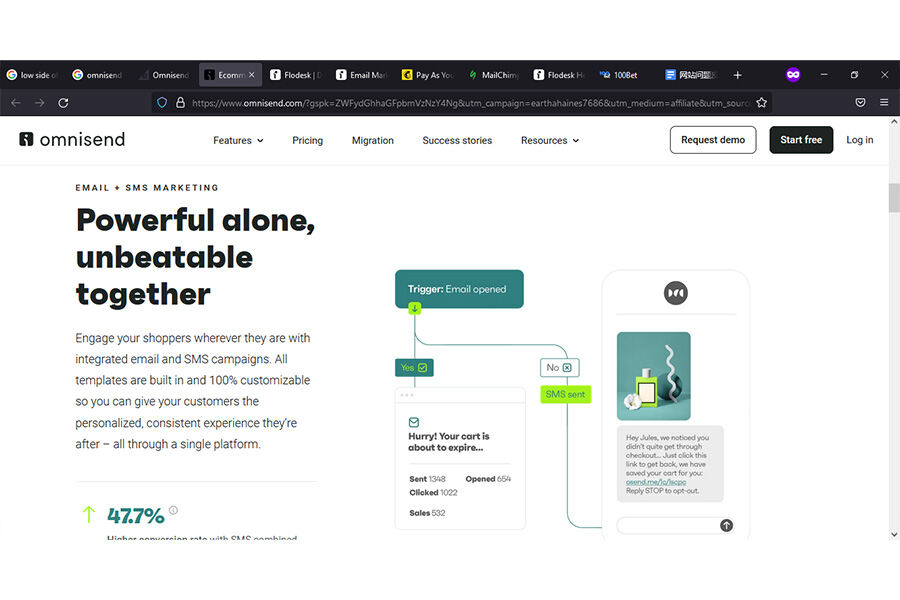
Omnisend, on the other hand, is another straightforward drag-and-drop email marketing solution for emails, pop-ups, forms, and landing pages. To be precise, it is not only a useful email marketing tool but also includes other mobile channels such as SMS, WhatsApp, and Facebook Messenger.
All these are made possible via its omnichannel automation workflow. By doing so, it allows ecommerce marketers to send timely emails, SMSs, and other alerts using a single automated procedure.
Omnisend has a free option with no restriction of access to all features so one could simply try all out and upgrade to other paid plans later as the business develops. The free option, however, imposes limitations in terms of the number of emails sendable per month and the number of contacts.
The Pro plan is especially useful for businesses with high SMS marketing demands as it offers bulk free SMS credits and allows unlimited email sendings. All paid plans come with live chat and priority support as well as a dedicated customer success manager. Find out more about Omnisend here.
Social media marketing tools
As of January 2022, almost six out of ten people on the planet are on social media platforms, which means more than half of the worldwide population is using social media. Such a high penetration rate means that no ecommerce marketer can overlook social media marketing and its related solutions. So read on for the top social media marketing tools to capitalize on the popularity of social media platforms:
- Buffer
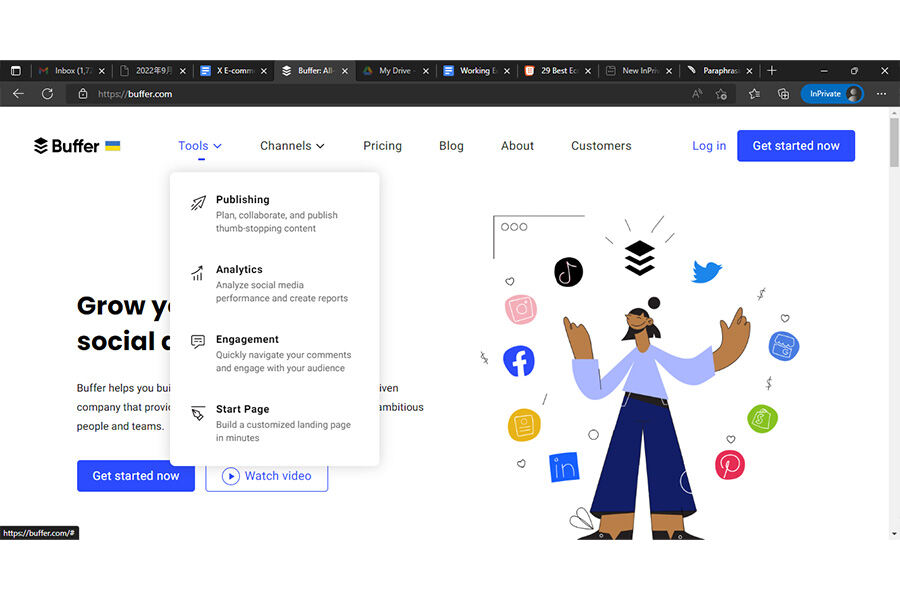
Buffer is a social media marketing tool that is equipped with some of the most recommended features such as pre-schedule content planning and creation on various social media directly. In other words, you can create and schedule your communications with your followers and view the interaction rates from your Buffer dashboard directly.
Content creation here is not limited to posts but also comments and other updates. Depending on pricing plans, it also comes with analytical features for marketers to track exposure.
Better still, access to up to 3 channels with a maximum of 30 posts in total is completely free. If additional channels are needed one’s account can be upgraded to a paid plan with a single user only or unlimited users. A free 14-day trial period is available for potential users to try out the full functionalities of Buffer.
- Hootsuite
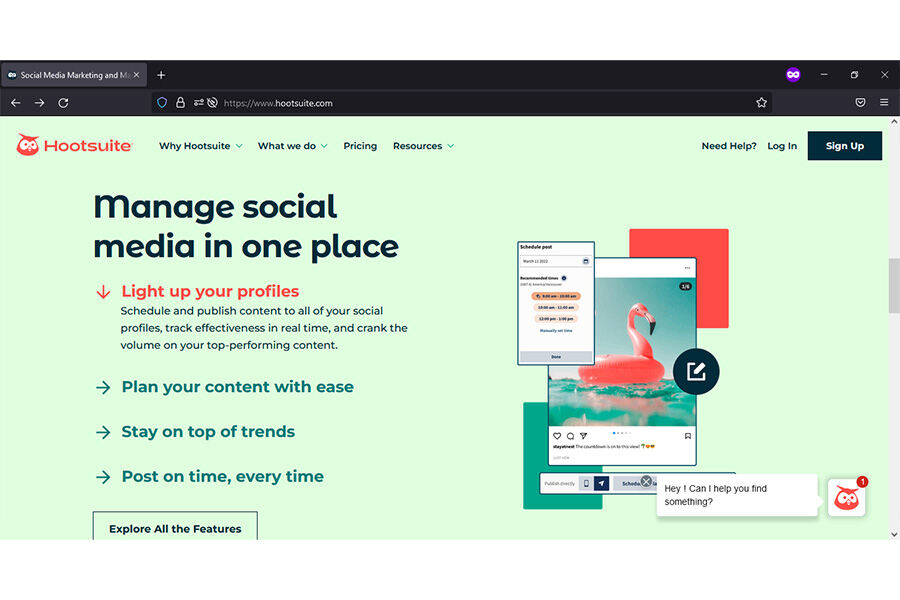
Another management and marketing tool for social media that ecommerce marketers should pay attention to is Hootsuite. Similarly, it provides management access to social media and covers direct integration with popular social media including YouTube, TikTok, Twitter, Instagram, Facebook, Pinterest, and LinkedIn.
On top of the must-have advanced content planning and creation features, Hootsuite also offers comprehensive analytical tools, an integrated social media conversation management tool as well as a social media ads management feature.
It grants a free 30-day trial while providing an always-free version, although it is pretty limited in terms of posts and channel allowance. Users with below 10 social media accounts can subscribe to a paid plan that is below the $100 monthly fee. All other plans however cost more than a 3-digit per month fee.
Analytic tools
Content and user experience are deeply intertwined. If the primary factor that sets one ecommerce site apart from another lies in the content itself, then a user or customer experience is undoubtedly the end result that every business owner should be aware of. Thankfully, useful web analytic tools such as Google Analytics and Hotjar can give us an idea of the user experience with the in-depth user behavior data they provide.
- Google Analytics
Google Analytics provides web analytics solutions with insights from a range of data and fundamental analytical capabilities to fulfill marketing and search engine optimization (SEO) needs. It gives a glimpse of user behaviors including their traffic origins by collecting info such as session stats, numbers of visitors, and their info including geolocation and device details.
The full-scale conversion tracking features such as newsletter signups, app purchases, and phone calls provide good fundamentals for online marketing return on investment (ROI) calculation and lay a foundation for subsequent customer improvement plans. It is a stats-focused tool that requires further user data interpretations.
Google Analytics is provided completely free by Google, and anyone with a Google account can register for it and proceed to set up the relevant website that needs to be analyzed. Find out how to proceed with it here.
- Hotjar
Hotjar, at the same time, adds user-focused advanced features such as a user behavior heatmap that provides a quick at-a-glance behavioral understanding on different pages, user journey session recordings, an integrated on-page survey, and a feedback widget for instant feedback per page.
All user-centered analytical info from Hotjar makes a great complement to the statistics from Google Analytics. Together, these data can assist the site owners and ecommerce management to design improvement plans that encourage individualized service and conversions.
Since both of these ecommerce marketing tools are free (Hotjar offers a free-forever version with some limitations though), ecommerce marketers may go on to make use of them side by side to complete their analytical needs. Hotjar also offers a free 15-day trial for its business plans for user comparison tests. Check out this link here for more details.
Take it to the next level
SEO and content creation, email marketing, social media marketing, and online analytics are the cornerstone of ecommerce marketing, and the tools presented here can help ecommerce marketers streamline their efforts and draw from a range of data-driven insights. This means that brands aiming to reach a larger market and increase their sales can harness the above ecommerce marketing tools to boost their marketing campaigns and stay relevant in an increasingly competitive global retail sector.



